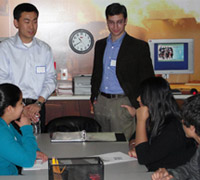 Most kids don't know what it's like to be an adult until one daybam!they're 18, and cast into the grown-up world of money, bills, and budgeting. That rite of passage can be daunting for teens who have never received personal finance training, which is something that Junior Achievement of Southern California staff realize. Every year, the volunteer-driven nonprofit reaches out to 10,000 seventh-through-12th graders to teach the 'tweens and teens about financial literacy, entrepreneurialism, and work-readiness, through a series of experiential programs.
Most kids don't know what it's like to be an adult until one daybam!they're 18, and cast into the grown-up world of money, bills, and budgeting. That rite of passage can be daunting for teens who have never received personal finance training, which is something that Junior Achievement of Southern California staff realize. Every year, the volunteer-driven nonprofit reaches out to 10,000 seventh-through-12th graders to teach the 'tweens and teens about financial literacy, entrepreneurialism, and work-readiness, through a series of experiential programs.
And for the first time this year, undergraduates in the Robert Day Scholars program, as well as RDS master's students, were there to help guide the students through JA's financial literacy curriculum. On a recent morning, students from Simons Middle School in Pomona arrived at the JA Finance Park (a sort of financial literacy lab on the outskirts of Griffith Park) in one of two busesthe other was loaded with Claremont McKenna College's RDS students.
Creating a partnership between Junior Achievementwhich relies heavily on trained volunteers to reach thousands of studentsand the Robert Day School of Economics and Finance, was an idea that had been brewing between RDS Director of Administration and Programs Brian Dennis and the director of development at Junior Achievement. "I thought it was a great idea," said Dennis. The Pomona middle-schoolers would be learning about finances from students at nearby Claremont McKenna College, while CMC's students would be adding a new, community service leadership component to the leadership development program they already undertake as RDS enrollees, while putting their financial skills to charitable use.
"I felt it was very important to include this type of civic engagement and experiential leadership training in our current leadership development program," Dennis said.
Adds RDS student Aisling Scott, "For children from low-income areas, personal finance does not come easy to their parents, and there may not be an opportunity for these children to learn about good techniques to budget money."
For the whole day, Simons students worked with their RDS counterparts at the JA Finance Park in simulation experiences. Videos of the process can be found online , but imagine a main room surrounded by storefronts: banking, dry cleaning, a fitness gym, retail shops, places to eatessentially, places to spend money. The young students were assigned fictitious life scenarios and fixed salaries: A single mother of three earning $38,000 a year; a husband earning $67,000 annually with no children, and so on.
It was the job of RDS students to walk the middle-schoolers through a budgeting process and teach them how to live within their means, all while paying bills and buying as needed from the storefronts around them. That meant starting with the basicsexplaining such things as how to use debit cards, the various services offered at banks, advantages and disadvantages of using credit, and the risks and benefits of saving and investing.
Dennis said the response was so positive on both sides that 11 RDS students visited Simons Middle School to continue working with sixth and seventh graders on financial literacy. RDS Scholars Aisling Scott and Madeline Chiavini have coordinated the training on the Simons campus over six consecutive Fridays.
"Watching the students at the Finance Park get excited about not exceeding their budgets inspired me to help teach my financial knowledge to others," Scott says. "The class I am working with (at Simons) is learning about global business, which will only continue to grow in importance as these students grow up. Giving them the tools and knowledge to make important financial decisions in the global economy has been a great joy."
Scott said she wanted RDS Scholars to utilize their finance skills to help others, a conviction shared by Chiavini. "We were lucky that Brian Dennis put together the JA activity at the Finance Park, which helped give us and our volunteers a background for the work we embarked on just before spring breakour financial literacy lessons with students at Simons," Chiavini says.
"Since the subject of money is a touchy subject, it is not often taught," Scott noted. "All of us are very blessed to have people in our lives who knew how to manage their personal finances well, and hopefully we have developed that skill also. Working with children from an early age to instill good financial decisions is an issue I feel strongly about. I have managed my own finances since I was about 8 years old, when my parents opened a bank account for me."
"Volunteering in this capacity makes me proud of being part of The Colleges, and allows us to be leaders in meaningful ways," Chiavini says.
RDS Scholars Teach Financial Literacy
To Middle-School Students from Pomona
Through Partnership with Junior Achievement Program
